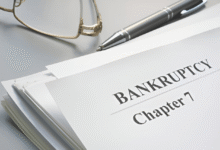Chapter 7 vs Chapter 13: What Bankruptcy Option Fits You Best?
Chapter 7 vs Chapter 13 bankruptcy. Compare debt relief options, eligibility, and pros/cons to choose the best path for your financial fresh start.

Bankruptcy can be a lifeline for those drowning in debt, but choosing between Chapter 7 and Chapter 13 is critical. These two options offer different paths to financial relief, each with unique eligibility requirements, processes, and long-term effects. Chapter 7 bankruptcy provides a faster discharge by liquidating non-exempt assets, while Chapter 13 bankruptcy allows debtors to reorganize payments over 3-5 years. Understanding which option aligns with your financial situation is key to making the right decision.
The choice between Chapter 7 and Chapter 13 bankruptcy depends on factors like income, assets, and the type of debt you carry. If you qualify, Chapter 7 can wipe out unsecured debts quickly, but it may require surrendering certain property. On the other hand, Chapter 13 lets you keep assets while catching up on missed payments, making it ideal for those with steady incomes. This guide will break down the pros, cons, and key differences to help you determine which bankruptcy chapter best suits your needs.
Chapter 7 vs Chapter 13
Chapter 7 Bankruptcy
Chapter 13 Bankruptcy
Chapter 13 bankruptcy, also known as “reorganization bankruptcy,” is tailored for individuals with a steady income who can repay a portion of their debts over time. Instead of liquidating assets, you propose a 3-5 year repayment plan based on your disposable income. This option is ideal if you’re behind on mortgage payments or want to keep valuable property. A key benefit of Chapter 13 is that it stops foreclosure, allowing you to catch up on missed payments over the plan’s duration. It also protects co-signers from collection efforts and can help reduce or eliminate certain debts, like second mortgages (through lien stripping).
Key Differences Between Chapter 7 and Chapter 13
Process and Debt Discharge
Chapter 7 uses asset liquidation to quickly discharge unsecured debts (3-6 months), while Chapter 13 reorganizes debts into a court-approved repayment plan (3-5 years). Chapter 7 eliminates qualifying debts entirely, whereas Chapter 13 requires partial or full repayment based on income. Both stop creditor actions via automatic stay, but discharge timelines differ significantly.
Eligibility Requirements
Chapter 7 requires passing a strict means test comparing income to state medians, while Chapter 13 demands regular income to fund repayments. Debt limits apply only to Chapter 13 (currently $2.75M for unsecured debts). Self-employed individuals and wage earners may qualify for either, but high earners typically must file Chapter 13.
Asset Protection and Loss Risks
Chapter 7 may force sale of non-exempt assets (luxury items, investments), while Chapter 13 protects all property by restructuring payments. Homeowners facing foreclosure often prefer Chapter 13’s payment catch-up provisions. Retirement accounts and essential assets receive protection under both chapters, but protection levels vary by state exemption laws.
Credit and Long-Term Impact
Chapter 7 remains on credit reports for 10 years versus 7 years for Chapter 13, but both initially lower credit scores 150-200 points. Rebuilding credit is possible within 1-2 years post-discharge, though Chapter 13 filers may qualify for mortgages sooner (2 years vs. 4 years for Chapter 7). Responsible credit use post-filing minimizes long-term damage.
Debt Types Handled Differently
Chapter 7 efficiently wipes out credit cards, Medical billing, and personal loans, while Chapter 13 better handles secured debts (mortgages/car loans) and priority debts (taxes/alimony). Student loans survive both chapters without undue hardship proofs. Chapter 13’s “lien stripping” can eliminate unsecured second mortgages, a unique advantage over Chapter 7.
Costs and Legal Complexity
Chapter 7 typically costs $1,500-$3,000 in legal fees and moves faster, while Chapter 13 costs $3,000-$5,000 with protracted court oversight. Both require credit counseling, but Chapter 13 involves more paperwork and hearings. Trustee oversight continues throughout Chapter 13’s repayment period versus Chapter 7’s brief administration.
Which Bankruptcy Option Is Right for You?
Income Level and Eligibility
If your income falls below your state’s median, Chapter 7 bankruptcy may be your best option, as it doesn’t require repayment. However, if you earn above the threshold or have regular income, Chapter 13 bankruptcy allows you to reorganize debts into a manageable 3-5 year plan. The means test determines Chapter 7 eligibility, while Chapter 13 requires proof of consistent earnings.
Asset Protection Needs
Chapter 7 may require surrendering non-exempt assets (like luxury items or secondary properties) to pay creditors. If you want to keep your home, car, or other valuable assets, Chapter 13 is often preferable—it halts foreclosure and repossession while you catch up on payments. State exemption laws play a key role in what you can protect under each chapter.
Type of Debt You Owe
For overwhelming unsecured debts (credit cards, medical bills), Chapter 7 provides faster relief by discharging them entirely. If you have secured debts (mortgages, car loans) or priority debts (taxes, child support), Chapter 13 lets you restructure payments and potentially reduce what you owe on second mortgages or car loans.
Timeline and Long-Term Impact
If you need immediate debt relief, Chapter 7 typically concludes in 3-6 months. Chapter 13 takes longer (3-5 years) but has a shorter credit impact (7 years vs. 10 years for Chapter 7). Consider whether you can commit to years of payments or prefer a quicker financial reset.
Future Financial Goals
If you plan to buy a home soon, Chapter 13 may be better some lenders consider applicants sooner after discharge than with Chapter 7. However, if you want a clean slate to rebuild credit faster, Chapter 7 eliminates debts quickly, allowing earlier credit repair efforts. Consulting a bankruptcy attorney ensures you choose the best path for your situation.
Read More: Struggling with Debt? Find Bankruptcy Lawyers by State
Conclusion
Bankruptcy is never an easy decision, but understanding the differences between 7 and Chapter 13 can help you choose the best path forward. If you need a fresh start and qualify for Chapter 7 bankruptcy, the quick discharge of unsecured debts may provide immediate relief. However, if you have a steady income and want to protect assets like your home or car, Chapter 13 bankruptcy offers a structured repayment plan that can help you regain financial stability over time.
Ultimately, the right choice both bankruptcy depends on your unique financial situation, goals, and ability to meet eligibility requirements. Consulting with a knowledgeable bankruptcy attorney can provide clarity and ensure you make the most informed decision. While both options impact your credit, they also offer a legal pathway to debt relief giving you the opportunity to rebuild your finances and move toward a more secure future.
FAQs
What’s the main difference between Chapter 7 and Chapter 13 bankruptcy?
Chapter 7 liquidates assets to wipe out debts quickly, while Chapter 13 creates a 3-5 year repayment plan to restructure debts while keeping property.
Will I lose my home if I file for Chapter 7?
Not necessarily homestead exemptions may protect your primary residence, but this varies by state. Chapter 13 often provides better protection for homeowners behind on payments.
How long does each bankruptcy stay on my credit report?
It remains for 10 years, while Chapter 13 drops off after 7 years from filing.
Can I choose which bankruptcy to file?
Not always your income, assets, and debt types determine eligibility (Chapter 7 requires passing a means test, while Chapter 13 needs steady income).
Does bankruptcy eliminate all debts?
No child support, alimony, most student loans, and recent taxes typically survive both Chapter 7 and Chapter 13 bankruptcies.











